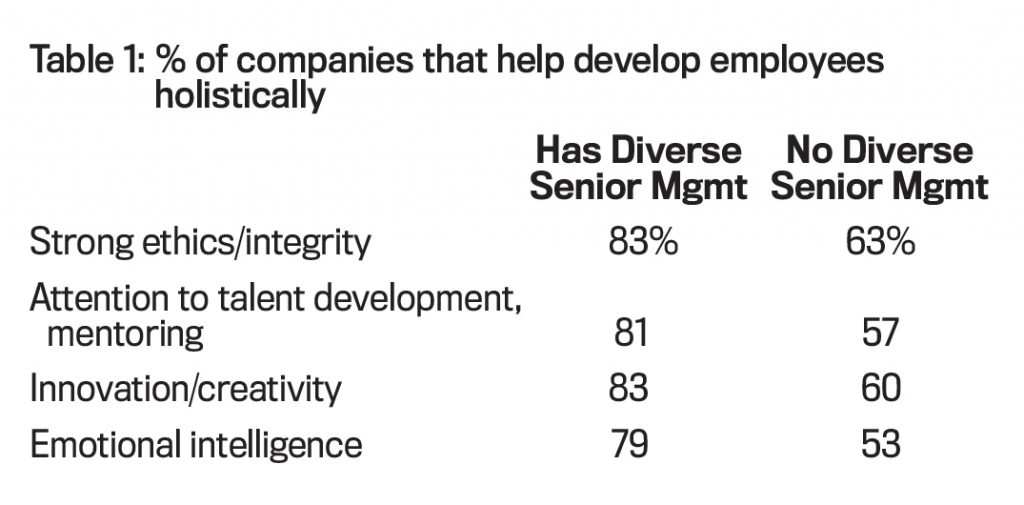The 2018 Global Survey of Millennials and Generation Z (Gen Z) by Deloitte shows a dramatic downward reversal of attitudes toward businesses’ motivation and ethics. The “2018 Deloitte Millenial Survey,” the seventh annual survey, included 10,455 Millennials in 36 countries and some 1,850 Gen Z respondents across six countries. Respondents have college degrees, are employed full time, and work predominantly in large, private-sector organizations.
With 56 million Millennials (age 21 to 36) working in the United States, they now represent the largest and fastest-growing generation in the U.S. workforce, comprising 33% of the total, according to Pew Research.
Key findings in the 2018 Deloitte study are that: 1) fewer Millennials believe that businesses act ethically and that businesses show a commitment to help improve society, 2) diversity in the workforce and flexibility of oversight are important to keeping a workforce satisfied, and 3) younger workers don’t feel adequately prepared to deal with the next generation of economic development, known as Industry 4.0.
Fewer than half of Millennials believe businesses behave ethically, compared with 65% last year. Concurrently, the number who think that business leaders are committed to helping improve society dropped to 47% from 62%. There is a continuing gap between the objectives Millennials think businesses should try to achieve and what their own company’s priorities were. Important to Millennials are 1) making a positive impact on society and the environment; 2) creating innovative ideas, products, and services; 3) creating jobs, developing careers, and improving people’s lives; and 4) emphasizing inclusion and diversity in the workplace.
Of the nine business objectives surveyed, three of the largest disconnects were negative, where the goals Millennials thought businesses should embrace less were far higher priorities on their company’s scale. These were: 1) generating profit, where desired business priorities were over employee desires by 27 percentage points, 2) producing and selling goods and services, over by 19 points, and 3) driving efficiency, or finding quicker and better ways of doing things, over by 18 points. The largest gaps where Millennials thought business goals were too low were: 1) generating jobs, under by 18 percentage points, and 2) improving society, e.g., educating, informing, and promoting health and well-being, under by 14.
The report states that Millennials believe corporate objectives should include increasing diversity and inclusion, improving society, developing innovative products and services, and creating jobs.
NEW CONCERNS
Climate change showed a significant shift in Millennials’ personal concerns, from near the bottom of the list last year up to a statistical tie with terrorism as the top concern. The study found a strong correlation between the level of concern for environmental issues and attitudes toward business. Nearly half of those having a generally negative opinion of business are also concerned about climate change or resource scarcity. Income inequality and unemployment were high concerns in both developing and developed markets.
Forward-thinking companies that are perceived by Millennials to be diverse are “able to help employees be more attuned to ethics, be more creative, develop talent more effectively and nurture emotional intelligence.” Consequently, 69% of Millennials who believe their senior management and organization are diverse report their working environment to be stimulating and motivating and thus likely to be more productive. It isn’t surprising that 78% of Millennials whose companies have diversity report higher profitability than companies not thought to reflect the wider society in which they operate. Employees in diverse companies also show more loyalty and desire to remain.
INDUSTRY 4.0
The Deloitte report concludes that “Companies with diverse senior management teams develop people holistically.” This is important preparation for succeeding in Industry 4.0. Table 1 shows the percentage of Millennials who believe their company helps them develop their awareness, knowledge, and skills, depending on whether it either does or doesn’t have a diverse senior management team.

Drilling more deeply into the effect various leaders are perceived as having on society, the survey shows Millennials most distrustful of political leaders, with 71% believing they’re having a negative effect and 19% a positive effect. Millennials also report negative feelings about religious/faith leaders, with 52% believing they’re having a negative effect and 33% a positive effect. Business leaders are slightly positive with 44% thinking they’re positive and 42% negative.
Topping the list of factors that will attract and retain young workers are financial rewards/benefits followed by a positive workplace culture. As other studies report, Millennials want to feel they’re doing important work that contributes to society as a whole as well as their own personal development.
IMA ETHICS HELPLINE
For clarification of how the IMA Statement of Ethical Professional Practice applies to your ethical dilemma, contact the IMA Ethics Helpline.
In the U.S. or Canada, dial (800) 245-1383. In other countries, dial the AT&T USA Direct Access Number from www.usa.att.com/traveler/index.jsp, then the above number.
The IMA Helpline is designed to provide clarification of provisions in the IMA Statement of Ethical Professional Practice, which contains suggestions on how to resolve ethical conflicts. The helpline cannot be considered a hotline to report specific suspected ethical violations.

August 2018



